
|
IN THIS PHOTO:
|
|
THE GAMEPLAN
DSWD Sec. Dinky Soliman shares her thoughts on addressing street dwelling problems to DILG Sec. Jesse Robredo with Manila Mayor Alfredo Lim behind her. |
| View Gallery |
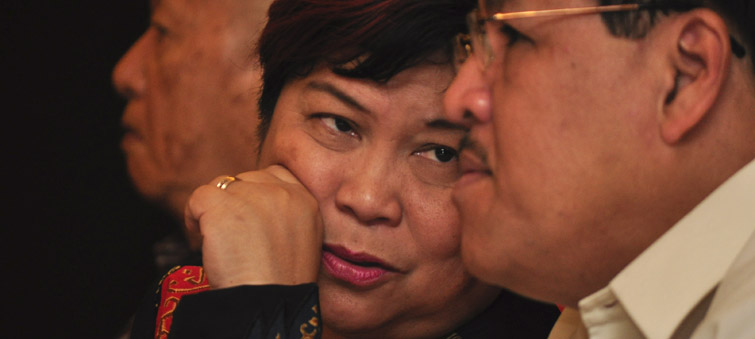
|
IN THIS PHOTO:
|
|
THE GAMEPLAN
DSWD Sec. Dinky Soliman shares her thoughts on addressing street dwelling problems to DILG Sec. Jesse Robredo with Manila Mayor Alfredo Lim behind her. |
| View Gallery |
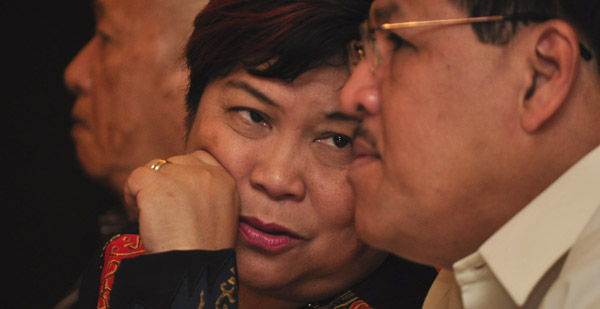
|
IN THIS PHOTO:
|
|
AS I SEE IT
DILG Sec. Jesse Robredo bats for cooperation between national and local government offices to achieve the zero street children goal. |
| View Gallery |
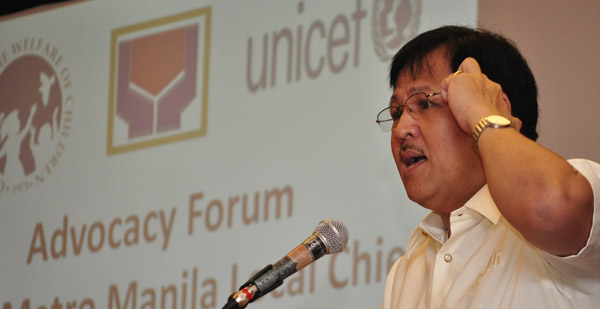
|
IN THIS PHOTO:
|
|
MAYOR LIM
City of Manila Alfredo Lim speaks before the press on his views about the "recurring problem" of street dwelling. |
| View Gallery |
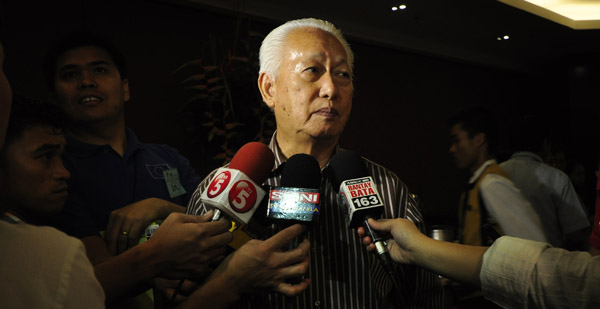
|
IN THIS PHOTO:
|
|
MULTI-STAKEHOLDER
Stakeholders take part at the advocacy forum for children's welfare held in Pasig City recently. |
| View Gallery |
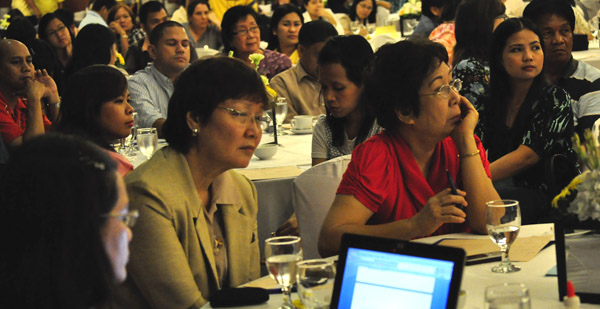
|
IN THIS PHOTO:
|
|
STREETSCAPE
MMDA Chairman Atty. Francis Tolentino vows his agency will take part in achieving the zero street children goal in 10 urban locations around Metro Manila. |
| View Gallery |
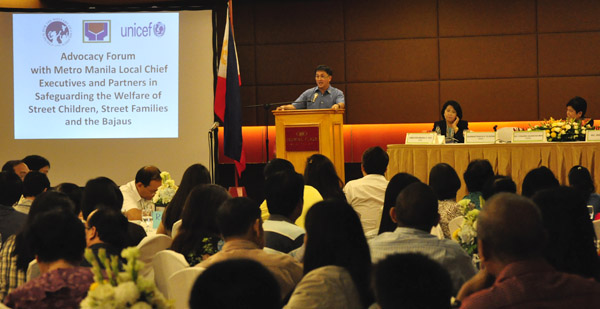
|
IN THIS PHOTO:
|
|
UNDAUNTED
DSWD Secretary Soliman and MMDA Chairman Tolentino signs on the commitment wall expressing their support to achieve zero street children goal in 10 urban points around Metro Manila. |
| View Gallery |
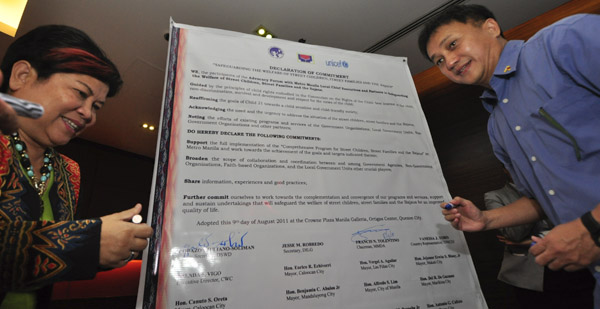
|
IN THIS PHOTO:
|
|
HELP WANTED
Valenzuela City Mayor Sherwin Gatchalian said his administration is open to explore other areas of cooperation with other agencies and non-government organizations to address street dwelling in key urban areas within its jurisdiction. |
| View Gallery |
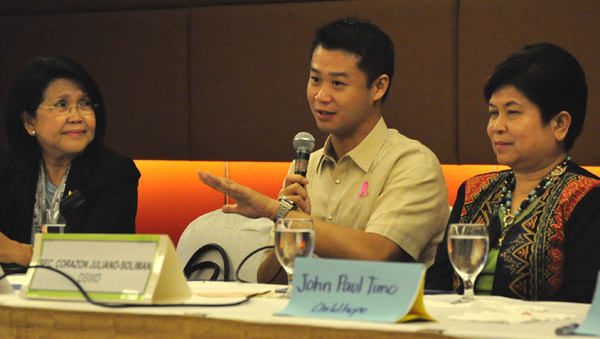
|
IN THIS PHOTO:
|
|
RENEWING CITY'S COMMITMENT
Mayor Sherwin T. Gatchalian declared the city's commitment to safeguard the welfare of street children and street families during the signing of a manifesto recently. |
| View Gallery |
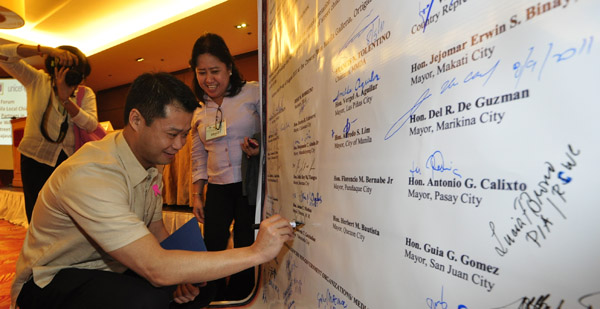
|
IN THIS PHOTO:
|
|
THE GOAL
DSWD Sec. Soliman said 10 areas in four cities have been targeted to be free of street dwellers by the end of 2011. |
| View Gallery |
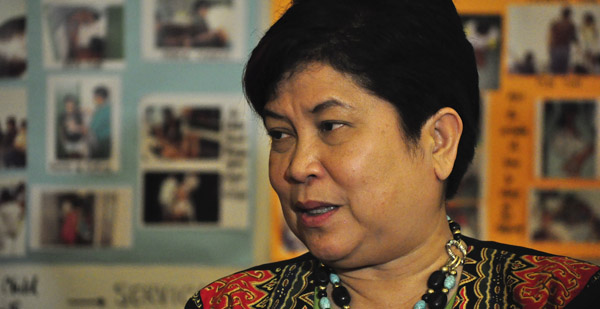

The Valenzuela City Government is bent on keeping its thoroughfares free of street children by strengthening existing city programs, and opening up to other areas of cooperation with other agencies and non-government organizations to address street dwelling in key urban areas within its jurisdiction.
City Mayor Sherwin T. Gatchalian declared yesterday the City’s commitment to the cause by leading the signing of a manifesto declaring commitment to safeguard the welfare of street children and street families, together with the Department of Interior and Local Government Secretary, Jesse Robredo, and Metro Manila Development Authority (MMDA) Chairman, Atty. Francis Tolentino, Department of Social Welfare and Development (DSWD) Secretary, Dinky Soliman, representatives from other local government units (LGUs), the Council for the Welfare of Children (CWC), an attached agency of the DSWD composed of a network of children’s rights advocates, and the United Nations Children’s Fund (UNICEF), and other stakeholders at an advocacy forum held at the Crowne Plaza Manila Galleria Hotel in Pasig City.
The alliance is hoping to achieve “zero street children, street families and the Bajaus in 38 listed areas with high incidence of street children and families in Metro Manila.”
Out of the 38, are 10 priority areas targeted to be free of street dwellers by the end of 2011. They are the stretch of Roxas Boulevard and Quirino Avenue to Pedro Gil Street in Manila; Cubao, East Avenue to P. Tuazon, Kalayan Road, Barangay E. Rodriguez and Quezon Avenue in Quezon City; Roxas Boulevard in CCP and Ninoy Aquino International Airport (NAIA) in Pasay City; and Balintawak area in Caloocan City.
Secretary Soliman said her office led in November 2010 a multi-agency rapid appraisal of the situation of street children, infants and street families and tallied an actual headcount of 3,072 street children and infants in Metro Manila, 55 of which were recorded in Valenzuela City.
The rapid appraisal also showed 657 families are living in the metro streets. None, however, could be found in the city.
In Valenzuela City, the City Social Welfare and Development Office (CSWDO), headed by Dorothy Evangelista, is the key agency exerting all efforts in rectifying the “recurring problem” of street dwelling.
This thrust is pursued through intensified rescue operations, the establishment of Bahay Kalinga in Barangay Veinte Reales that serves as a hub for those in need for immediate care and counseling; and a host of after-care services to rescued and reached-out street children such as livelihood programs, and Alternative Learning System (ALS) and other education assistance programs.
However, Ms. Evangelista noted in an earlier interview that not all street children rescued in different parts of Valenzuela City are actual local residents. “A number of them are transients from nearby towns and cities and would come here to beg in our streets. We turn them over to the respective authorities.”
The CSWDO also receives reports, either by call or by e-mail, from concerned citizens of the presence of street children. “But many of them are recidivist who were rescued a couple of times but would end up again in the streets,” Ms. Evangelista added.
This brought the CSWDO to have guardians of rescued children to undergo Parent Effective Service (PES) program in a firm conclusion that responsible parenting is also essential in preventing children from engaging in various unduly street activities such as vagrancy and begging.
The PES aims to make indigent parents become more aware of the basic rights of their children. The city official emphasized this form of government intervention promises to curb urban problems bred by domestic-related issues.
Ms. Evangelista further revealed that the CSWDO has livelihood assistance to parents or guardians to help them cope up with their economic situation. In case the guardians have decided to go back to their provincial hometown instead, they could avail of the “Balik-Probinsya Program,” which the City Government allocates fund with.
 Latest News
Latest News Archive
Archive Category
Category

